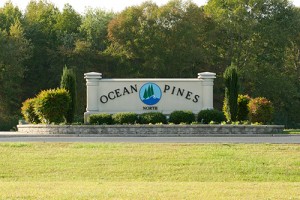
BERLIN– Ocean Pines.
Home to more than a quarter of Worcester County’s population, the community at the north end of the county has its own post office, police station, library and community center. The Census Designated Place has two fire stations, several parks and even a farmers market. What it doesn’t have is municipal standing.
It’s easy to forget that Ocean Pines, unlike its neighbors, is not a town. In spite of its size, amenities and services, it remains no more than a homeowner’s association. That’s something that’s unlikely to change.
Founded in the 1960s, Ocean Pines started out as a tiny community of vacation homes in a copse of waterfront pines. During the next 40 years, however, what began as a quiet place to spend the summer would gradually transform into a year-round community of close to 15,000. So just why hasn’t municipal incorporation come to Ocean Pines?
According to Jim Peck, director of research for the Maryland Municipal League (MML), in the first half of the 20th Century, municipalities were created through the passage of legislation in Maryland’s General Assembly.
“Two, three, sometimes four municipalities were created each year,” he said.
In the mid-1950s, however, the process changed. There are now several steps a community needs to take to incorporate. According to MML’s Municipal Incorporation Handbook, the first step is a petition. An area seeking to become a municipality, which must have a minimum population of 300, is tasked with circulating a petition in support of incorporation. The petition must be signed by at least 20 percent of the people residing within the area who are registered to vote in county elections.
Once a petition with enough qualified signatures is generated, it’s submitted to county officials. They may or may not schedule a referendum on the issue.
“The role of the county governing body in this process is significant,” the MML handbook reads. “Not only is discretion clear in the language of the law — that is, that a county ‘may’ rather than shall schedule an incorporation referendum — but full and final authority has been granted to the county in matters of incorporation.”
If a county does allow an incorporation referendum, it’s submitted to the registered voters of the area proposed for incorporation and is conducted like any county election. If a majority of those voting support incorporation, an incorporated municipality is formed and the cost of the election is borne by the new town. If the referendum fails, the cost is absorbed by the county.
According to Peck, county governments that deny interested communities a referendum are often afraid of the taxes that would be lost with the creation of another municipality.
“Among their biggest concerns is loss of revenues,” Peck said.
Officials from Worcester County failed to return a request for comment on what financial effect the county would feel if Ocean Pines became a municipality.
Since 1955, Maryland has seen just six new incorporated communities. Peck’s organization, however, continues to provide anyone interested with information on the process.
“We get inquiries all the time,” he said.
Usually, the motivation is an interest in bringing authority over planning and zoning down to a local level. It would otherwise fall under the purview of county government. There’s also a general desire for more local control.
“Home rule authority rather than have the county be the determiner as to what services are provided,” Peck said.
That, perhaps, is what has interested Ocean Pines residents in incorporation several times in the past.
“It’s come up a number of times,” said Dave Stevens, a member of the Ocean Pines Association’s board of directors.
He said the argument made in favor of incorporation in recent years is the state funding and grant money that would potentially be available.
Longtime resident and operator of the Ocean Pines Forum Joe Reynolds says grants would be available but not at the level that would make the effort worthwhile.
“I don’t see that being large enough to offset the potential cost of an added layer of government,” he said.
If the Pines were incorporated, though there would be a new municipal government, the homeowner’s association, the Ocean Pines Association (OPA) itself would still exist.
“OPA will continue to own everything it owns now,” Stevens said. “If there was a municipality, OPA couldn’t go away. You can’t just dissolve the OPA. The corporation is what owns the assets.”
He added that the annual assessments charged to homeowners probably wouldn’t go away either, as the association’s buildings would still need to be maintained.
“The homeowner’s association can continue to collect assessments and the municipality can impose property taxes,” Reynolds said. “The increase in government intrusion would be more than double.”
He and Stevens agreed though, that the primary reason Ocean Pines was not likely to become a town was the fact that more than half of its homeowners were not residents. Many people still just use their homes in the Pines as summer getaways.
“The issue is half the people that are members don’t live in Ocean Pines,” Stevens said. “In a municipality they’d not be represented.”
Currently, all property owners are OPA members and have the ability to vote on who represents them on the association’s board of directors. The board acts much like a town council would, meeting monthly and making decisions regarding the association’s future. If the Pines were to become a municipality, while all its members would retain a say in who served on the homeowner’s association’s board of directors, they wouldn’t be able to participate in municipal elections and referendums unless they were permanent residents.
“In my perspective, it’s a real loser,” Reynolds said. “I don’t see it as a viable or interesting option for Ocean Pines.”

